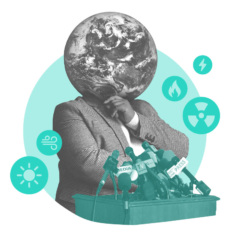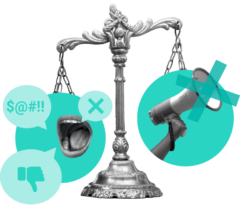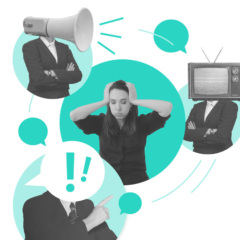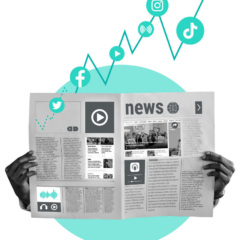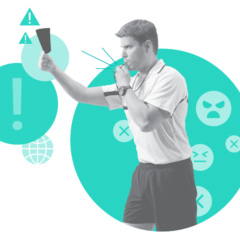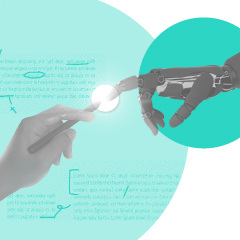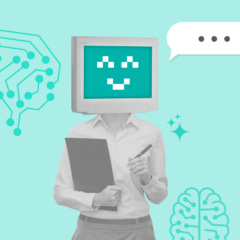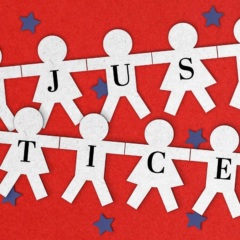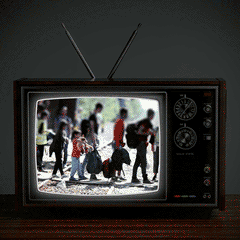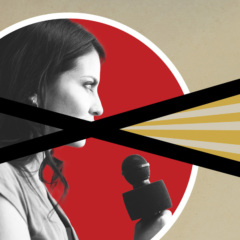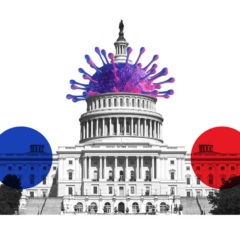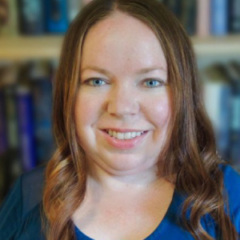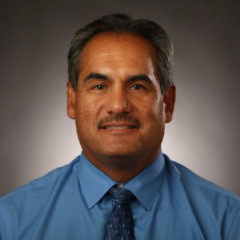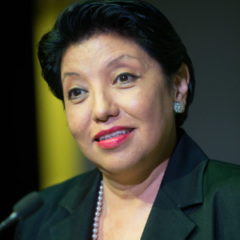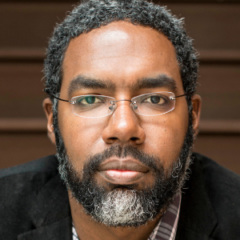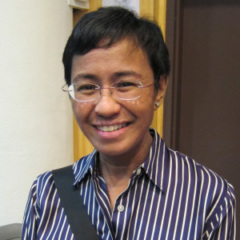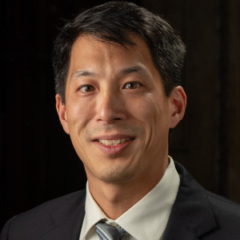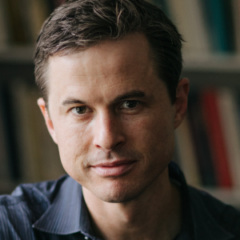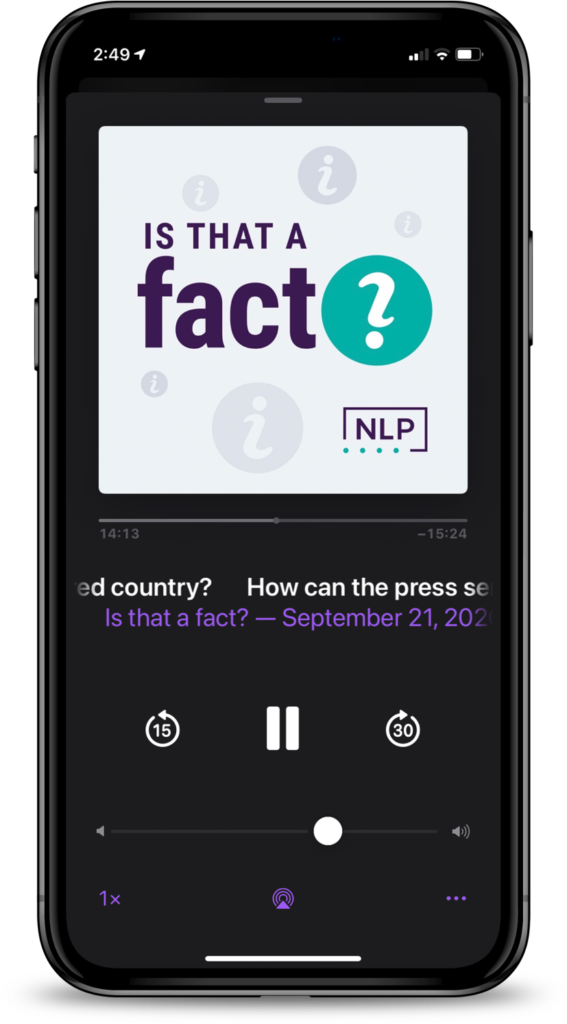
Is that a fact?
Influencers have come to dominate our social media feeds by projecting an authenticity that lends them credibility in today’s media landscape. But behind the scenes lies a complex marketing system designed to promote the brands that support the livelihoods of these influencers that is often less than transparent. In our latest episode we speak with Emily Hund, author of The Influencer Industry: The Quest for Authenticity on Social Media, about the evolution of social media influencers and how disparate events like rapid advances in technology and the decline of traditional news outlets have boosted their prevalence and impact since their emergence during the Great Recession.
AVAILABLE ON:
All Episodes
NLP’s podcast Is that a fact? informs listeners about news literacy issues that affect their lives through informative conversations with journalists and other experts across a wide range of disciplines.
Season 3 Episode 9
Friend or foe? The rise of the social media influencer
Influencers have come to dominate our social media feeds by projecting an authenticity that lends them credibility in today’s media landscape. But behind the scenes lies a complex marketing system designed to promote the brands that support the livelihoods of these influencers that is often less than transparent.
Season 3 Episode 8
The lure of health and wellness misinformation
In this episode, we discussed the hidden dangers of health and wellness mis- and disinformation with Derek Beres, co-author of Conspirituality: How New Age Conspiracy Theories Became a Health Threat and co-host of the podcast Conspirituality.
Season 3 Episode 7
Beyond hot takes: Reporting on a warming planet
Things have been heating up — literally — since Sabrina Shankman, our latest podcast guest, began covering climate change a decade ago. The scientific community has presented indisputable evidence that climate change is the result of carbon emissions from human activity. News organizations have committed more resources to covering the complex topic. And climate deniers and the misinformation they spread have evolved along with the conversation.
Season 3 Episode 6
Could lawsuits meant to curb disinformation hurt press freedom?
Libel laws and the First Amendment in the United States are meant to hit a sweet spot — protecting reputations and facts while also affording journalists the freedom to publish unflattering information about powerful people that the public needs to know. But disinformation is increasingly threatening that balance.
Season 3 Episode 5
Opinion creep: How facts lost ground in the battle for our attention
Have you ever scratched your head when reading an article or watching the news and wondered if you were getting facts or opinion? If so, you’re not alone. News organizations have not made it easy for consumers to differentiate between news and the views of an individual or media outlet.
Season 3 Episode 4
The future of newsrooms: Innovation and authenticity
In today’s episode of our podcast Is that a fact?, guest LaSharah Bunting, CEO and executive director of the Online News Association, discusses how digital innovation has allowed newsrooms to create deeper connections with their audiences so they can better understand the needs of the communities they serve.
Season 3 Episode 3
Flagrant foul: Misinformation and sports
In today’s episode of our podcast Is that a fact?, guest host Jake Lloyd digs into how misinformation manifests in the sports world with author and journalist Jemele Hill.
Season 3 Episode 2
Will chatbots change how journalism is practiced?
Our guest on this episode is Madhumita Murgia, the first artificial intelligence editor at the Financial Times, based in London. We talked about how generative AI is changing journalism.
Season 3 Episode 1
Chatbots are supercharging search: Are we ready?
Our guest on this episode is Will Knight, senior writer about artificial intelligence at WIRED magazine. We discuss how ChatGPT is being applied to search and what some of the potential and pitfalls are of this new class of technology known as “generative AI.”
Season 2 Episode 7
Sandy Hook at 10: Tragedy, conspiracy theories and justice, part two
This episode of “Is that a Fact?” is part two of a two-part episode marking the 10th anniversary of the shooting at Sandy Hook Elementary School in Newtown, Connecticut, on Dec. 14, 2012, when a gunman murdered 20 first graders and six adults.
Season 2 Episode 6
Sandy Hook at 10: Tragedy, conspiracy theories and justice, part one
This episode of “Is that a Fact?” is part one of a two-part episode marking the 10th anniversary of the shooting at Sandy Hook Elementary School in Newtown, Connecticut, on Dec. 14, 2012, when a gunman murdered 20 first graders and six adults. Soon after, conspiracy theories calling the massacre a hoax emerged. And they have persisted for a decade, thanks to amplification and profiteering by alt-Right media figure Alex Jones.
Season 2 Episode 5
Are journalists getting the immigration story right?
In this episode, we interview Dr. Reece Jones, chair of the Department of Geography and Environment at the University of Hawaii at Manoa and author of White Borders: The History of Race and Immigration in the United States from Chinese Exclusion to the Border Wall, for an overview of the most enduring false narratives that have shaped our public conversations about immigration.
Season 2 Episode 4
Disinformation and Russia’s War in Ukraine
In this episode we talk to two journalists covering the Russian invasion of Ukraine to help us better understand how disinformation and propaganda are obscuring, or outright contradicting, the facts, both within Russia and beyond its borders.
Season 2 Episode 3
The politicization of the pandemic
In this episode, we set out to explore whether false narratives about the pandemic and the COVID-19 vaccines have overshadowed science or whether science has managed to hold its own, particularly in light of the politicization of the pandemic.
Season 2 Episode 2
Perception or reality: Just how divided is America, really?
In this episode, we set out to explore whether the narrative of the country’s deep political polarization is fiction or reality.
Season 2 Episode 1
How 9/11 truthers planted the seeds for QAnon
For the second season of Is that a fact?, we’re exploring the origins of false narratives and the harm they have caused.
Season 1 Episode 11
Special: Is misinformation to blame for vaccine hesitancy?
In this special episode of “Is that a fact?” we explore why some people remain hesitant to get one of the COVID-19 vaccines, despite growing evidence that inoculation is the key to getting our lives and the economy back on track, and we consider how much misinformation is to blame.
Season 1 Episode 10
How much did misinformation impact the election?
In our season finale, Enrique Acevedo of CBS’ “60 in 6,” Dr. Joan Donovan of the Shorenstein Center and Jane Lytvynenko of BuzzFeed News discuss how misinformation impacted the 2020 elections and what the near future of misinformation might look like.
Season 1 Episode 9
Truth Decay: Why Americans are turning away from facts
In our penultimate episode of the season, we speak to Jennifer Kavanagh, senior political scientist at RAND corporation, who describes a growing phenomenon she and her colleagues call “Truth Decay” and why Americans are rejecting formally trusted institutions.
Season 1 Episode 8
The mainstreaming of conspiracy theories
In this episode, Cindy Otis, a former CIA analyst who is now the vice president for analysis for Alethea Group, where she leads disinformation investigations in the private sector explains why conspiracy theories have become more mainstream, what’s lending them such currency and what we can do to inoculate ourselves against them.
Season 1 Episode 7
Why democracy falters without local news
We speak to Gilbert Bailon, the editor-in-chief of the St. Louis Post-Dispatch, about the importance of local news to American democracy and why we all should care about the loss of local newspapers across the country.
Season 1 Episode 6
Who are journalism's new gatekeepers?
Rebecca Aguilar, a multiple Emmy award-winning reporter who recently became the first Latina president-elect of the Society of Professional Journalists, talks about how the gatekeeping role of journalists has been altered by the internet and social media, what’s been lost, but also what’s been gained.
Season 1 Episode 5
Here's what we know about Russia's disinformation campaigns
Deen Freelon, associate professor at the Hussman School of Journalism and Media at UNC, Chapel Hill talks about how foreign adversaries, and particularly the Internet Research Agency in Russia, are using social media platforms against us.
Season 1 Episode 4
Kara Swisher on why Facebook is a threat to democracy
In this episode, our guest is Kara Swisher, one of the premiere tech columnists in the country, who talked about how social media platforms have affected our ability to talk to one another.
Season 1 Episode 3
Can journalism survive an authoritarian ruler?
In this episode, we speak to Filipina journalist Maria Ressa about the rise of misinformation, the role of tech in misinformation and her battles with President Duterte.
Season 1 Episode 2
How can the press serve our fractured country?
In this episode, we speak to Michael Luo, editor of the newyorker.com, about a piece he wrote on The Hutchins Commission which was formed during World War II to decide how the press could serve democracy during a period of intense political strife and distrust in the media.
Season 1 Episode 1
Can democracy survive the rise of misinformation?
In our premiere episode of this first season of our podcast, we talk to Dartmouth government professor Brendan Nyhan about the state of American democracy today.


